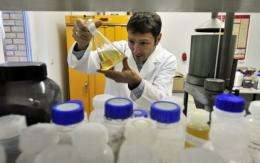Stockholm Convention scientists seek ban on chemical

Scientists at the Stockholm Convention, which interdicts dangerous chemicals, said on Friday they will recommend the banning of a flame retardant commonly used in polystyrene.
The scientific committee of the Stockholm Convention on Persistent Organic Pollutants said it was "recommending that the chemical hexabromocyclododecane" (HBCD) be listed under the Convention."
This means that the chemical, also used in textile coatings and in polystyrene used for electrical and electronic equipment, could be eliminated or subject to restrictions.
Member states of the Convention would meet in 2013 to decide what to do about the toxic substance.
The Stockholm Convention bans or restricts hazardous pesticides and industrial chemicals that can kill, damage the nervous and immune system, cause cancer and reproductive disorders or interfere with normal child growth.
The 2001 treaty, signed by 176 nations, originally covered 12 chemicals known as Persistent Organic Pollutants (POPs) because they do not break down over time in the environment and accumulate in soil, water, the food chain and in human tissue or organs such as the liver.
It now covers 22 pollutants.
(c) 2011 AFP


















